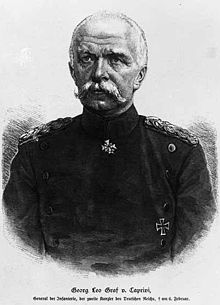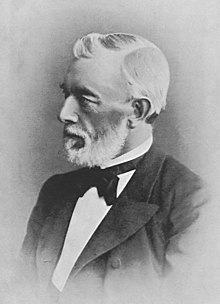New course (German Reich)
The “ new course ” is a term used to describe the domestic political reorientation after Otto von Bismarck's dismissal in the German Empire . From modern science he is mostly equated with the time of the chancellorship of Leo von Caprivi (1890-1894). Some representatives of the new course initially remained in office under Prince Chlodwig zu Hohenlohe-Schillingsfürst . The term is only rarely applied to Wilhelm II's urge to expand in foreign policy since the second half of the 1890s.
Concept and goals
The term “new course” was used as a political term as early as April 1890 as a modification of a telegram from Wilhelm II.
The central engine was the Chancellor and temporarily Prussian Prime Minister Caprivi. At least initially he was supported by Finance Minister Johannes von Miquel . Trade Minister Hans Hermann von Berlepsch , Interior Minister Ernst Ludwig Herrfurth and War Minister Hans von Kaltenborn-Stachau played an important role in the individual policy areas of the Prussian State Ministry . At the national level, the State Secretaries Karl Heinrich von Boetticher and Adolf Marschall von Bieberstein were added.
The new course initially consisted of turning away from the politics of confrontation and division as pursued by Otto von Bismarck. Instead, an attempt was made to withdraw the monarchical state from the immediate social conflicts and to let it become a neutral body that stood above and moderated social conflicts. The aim of the Caprivi government was internal reconciliation, that is, an attempt should be made to reintegrate into society those sections of the population who had been marginalized in the era of Otto von Bismarck. A statement made by the later Chancellor Bernhard von Bülow in 1890 makes it clear how urgent the contemporaries thought reforms were : "Since 1808 - Stein and Hardenberg - we have had no such urge to reform."
A reform policy, even if its goals are ultimately limited, should alleviate the social conflicts. At the same time, the government tried to find new support after the break-up of the party cartel and to overcome the difficult time after Bismarck's dismissal. Ultimately, it was a matter of igniting a new dynamic in place of the political immobility of the last decade of Bismarck's government.
To a certain extent, this policy was successful in the area of social and foreign trade policy and, to a limited extent, also for Prussian domestic policy.
Social policy

Behind the action in the area of social policy was the opinion that Bismarck's attempt to break the influence of the social democrats on the workers by introducing social insurance had failed. In their place, the government now resorted to reform concepts that had already been on the political agenda in the 1870s. Above all, Berlepsch relied on the expansion of labor protection and a reform of labor law . This policy was initially supported by Wilhelm II and his idea of a "social empire". In the emperor's February decrees of 1890, that is, at the time of Bismarck's chancellorship, it was made an official program.
A concrete result was the trade regulation amendment of 1891. This banned Sunday work , the work of children under 14 years in factories was abolished and the working hours of young people and women were restricted. Work in unhealthy companies was also subjected to stricter requirements. The labor inspectorate has been strengthened to monitor labor protection measures. In addition, labor regulations and trade courts were set up to settle labor law conflicts between workers and entrepreneurs. However, the bill originally contained provisions also to an aggravation of the right of association . Under pressure from the center and the Liberal Party , these passages were deleted again. The bill was accepted by a large majority in the Reichstag . Only the Social Democrats did not agree, as their claims went further. Overall, this policy meant an important step towards the emergence of welfare state structures in the German Empire.
Trade policy
In the field of foreign trade policy, the expiry of the trade agreements with France and other states in 1892 threatened higher tariffs and possibly even outright trade wars. To counteract this, long-term trade agreements were concluded between 1891 and 1893 with Austria-Hungary , Italy , Belgium , Switzerland , Spain , Serbia and Romania and finally with Russia . This created a system of trade agreements that not least served to promote the export of German industrial products. Behind this was the realization that not agriculture, but only an expanding industry could provide enough jobs for a growing population. The central problem was that advantages in industrial exports from the contractual partners could only be achieved through concessions on agricultural tariffs. From politics in favor of agriculture, Caprivi shifted the emphasis in trade politics to industry.
Reform of the Prussian municipal code
The reform policy of the new course encompassed not only the Reich, but the leading politicians also tried to implement changes in Prussia . There the reform of the municipal code in the 1870s initially failed. This was followed up again. The draft of a new rural community order was opposed by the conservatives, and in 1891 they succeeded in defusing this in the Prussian state parliament in their favor. Originally it was planned to merge small communities and neighboring manor districts. The Conservatives got both sides to agree. As a result, the law only affected 3% of the manor boroughs. Other reform projects in this policy area also failed. The legislation could not change anything decisive in the strong position of the manor owners in East Elbe . There was also little progress in reforming the Prussian three-class suffrage .
Miquel's tax reform
In contrast, Finance Minister Miquel's tax reform was successful. A modern income tax was introduced in Prussia in 1891 . It replaced the complicated class and real taxes . A wide range of income types and sources have now been recorded . The state thus participated in the growing national product. The transition from an agricultural to an industrial state was also reflected in tax law . A tax-free subsistence level was introduced, a tax progression , albeit a weak one, and the option of claiming certain deductions. Overall, the lower income groups were relieved, and the principle of taxing taxpayers according to their ability finally prevailed. In addition, the trade tax was introduced for large companies. Property, building and trade tax were left entirely to the municipalities in 1892. This had positive effects on the financial situation of the cities and municipalities. In 1893, a wealth tax was added in favor of the country. However, in this policy area too, the government was forced to make concessions in favor of large estates . Apart from that, the reform brought progress in terms of tax justice . Linked to this, however, was an increase in the efficiency of the tax administration. Ultimately, it was possible to put the Prussian state on a better financial basis through higher tax revenue.
Resistances
As a result of the crisis surrounding the new school law, the government lost much of its initial willingness to support both the center and the liberals in 1892. With the separation of the offices of Reich Chancellor and Prussian Prime Minister, this led to Caprivi losing power considerably. He also found it increasingly difficult to find approval in the Reichstag. The next crisis came with the army bill of 1892/93. This meant a significant increase in armament efforts. To enforce this, the Chancellor made concessions such as the approval of military costs not every seven but every four years and the introduction of a two-year term of service instead of three. But Caprivi was only able to enforce his ideas after the Reichstag was dissolved and new elections were held.
Resistance to the policy of the new course came mainly from the conservative side. The criticism of the trade agreements, which were viewed as hostile to agriculture, led to the establishment of the Federation of Farmers and ultimately to the radicalization of the German conservative party .
More and more Caprivi also lost the support of Wilhelm II. Wilhelm II wanted to shape politics more himself and aimed at the establishment of a "personal regiment". Whether he succeeded in this remains a matter of dispute in research. The peak of imperial influence, however, was not until after 1894. A central reason for Wilhelm II's departure from the New Course was that this policy had failed because it increased the legitimacy of the monarchy. On the contrary, it helped drive the conservatives into the opposition.
End of the new course
The end of the actual policy of the new course came in 1894 with the disputes over the overturn bill . Opponents of the new course, such as the Prussian Prime Minister Botho zu Eulenburg , industrial circles around Carl Ferdinand von Stumm-Halberg , representatives of agriculture, the military and parts of the court, campaigned for a new special law against the Social Democrats . But national liberals and free conservatives also joined in. The decisive factor for the protagonists of the new course, who rejected a special law, was that Wilhelm II opposed the Chancellor. Ultimately, this ended in October 1894 with the dismissal of both Caprivis and Eulenburg. Even if some exponents of the new course initially retained their offices under Prince Clovis zu Hohenlohe-Schillingsfürst, the opponents had finally largely prevailed.
Historiographical assessment
Hans-Peter Ullmann sums up that the policy of the New Course did indeed initiate some reforms and overcome the stagnation of the late Bismarck years, but the scope of the reforms remained limited. They were committed to an “enlightened conservatism” that was no longer up to date. The reforms did not go far enough to change the system, but were too far-reaching not to encounter massive resistance.
Individual evidence
- ↑ Spenkuch, Introduction, p. 3
- ↑ Ullmann, pp. 138f.
- ↑ Spenkuch, Introduction, p. 4
- ↑ Ullmann, p. 139
- ↑ See collection of sources on the history of German social policy 1867 to 1914 , III. Department: Development and differentiation of social policy since the beginning of the New Course (1890-1904), Volume 3, worker protection , edited by Wolfgang Ayaß , Darmstadt 2005; ibid: Volume 4, Workers' Law , edited by Wilfried Rudloff, Darmstadt 2011.
- ↑ Ullmann p. 139
- ↑ Ullmann, p. 139, Loth, p. 93
- ↑ Ullmann, p. 140
- ↑ Ullmann, p. 140, Loth, p. 94
- ↑ Loth, p. 94
- ↑ Ullmann, pp. 142f.
- ↑ Ullmann p. 143f
- ↑ Ullmann, p. 145
- ↑ Ullmann, p. 141
literature
- Wilfried Loth: The Empire. Authority and Political Mobilization. Munich 1996, ISBN 3-423-04505-1 .
- Hartwin Spenkuch (arr.): The minutes of the Prussian State Ministry 1817–1934 / 38. Volume 8 / I and Volume 8 / II: March 21, 1890 to October 9, 1900. Hildesheim / Zurich / New York 2003 (= Acta Borussica New Series, 1st row: The Protocols of the Prussian State Ministry 1817–1934 / 38)
- Hans-Peter Ullmann: The German Empire 1871-1918. Frankfurt 1995, ISBN 3-518-11546-4 .

